- Home
- Cary Fagan
A Bird's Eye
A Bird's Eye Read online
Copyright © 2013 Cary Fagan
All rights reserved. No part of this publication may be reproduced or transmitted in any form or by any means, electronic or mechanical, including photocopying, recording, or any information storage and retrieval system, without permission in writing from the publisher.
Distribution of this electronic edition via the Internet or any other means without the permission of the publisher is illegal. Please do not participate in electronic piracy of copyrighted material; purchase only authorized electronic editions. We appreciate your support of the author’s rights.
This edition published in 2013 by
House of Anansi Press Inc.
110 Spadina Avenue, Suite 801
Toronto, ON, M5V 2K4
Tel. 416-363-4343
Fax 416-363-1017
www.houseofanansi.com
Library and Archives Canada Cataloguing in Publication
Fagan, Cary, author
A bird’s eye / Cary Fagan.
Issued in print and electronic formats.
ISBN 978-1-77089-310-8 (bound).—ISBN 978-1-77089-311-5 (html)
I. Title.
PS8561.A375B57 2013 C813’.54 C2013-902796-3
C2013-902797-1
Cover design: Brian Morgan
We acknowledge for their financial support of our publishing program the Canada Council for the Arts, the Ontario Arts Council, and the Government of Canada through the Canada Book Fund.
In memory of Michael Hersco
My mother was born in a village infested with flies and smelling of donkey shit. It was a day’s walk from Naples. This was 1901. She was born on the bare ground, nobody having the sense to bring a woman in labour inside while she could still walk; this, at least, is what my mother told me, but of course she felt only bitterness towards the place. Around her stood my grandmother’s useless husband, her oldest sister, and a girl who was going to become a midwife but hadn’t begun her training and wailed the whole time.
As soon as she was born, they saw it. On her tiny face a birthmark. Pale at birth but darkening over time, the birthmark had the exact shape of a handprint — forefinger reaching the right eye, thumb just behind the ear, pinky near the lip. She grew into a pretty young woman otherwise, fine featured, with full breasts and hips and a narrow waist, dark eyes. But all anybody in that village saw was her birthmark. They said that it was a clear sign, although they argued about what it meant. Some believed it proved that her mother had been a whore, others that the devil had disguised himself one night and was the true father, still others that a spirit or ghost lived inside her and would one day push out, splitting her skin from head to foot. All they agreed on was that she was defiled.
To this day I hate all villages and small towns anywhere for their closed-mindedness and collective stupidity. Give me a city, no matter how infested with con artists and the broken-hearted and the obscenely rich. The villagers took to calling her the Dark One. They did not let their own children play or even speak with her. She could not go to school, for her mere presence was declared disruptive. Her two older sisters resented her for stigmatizing them, and made her their servant from the youngest age. Her father hated being a figure of pity, which was a good-enough reason for him to beat her. The only one who loved her was her mother, and she died early of the influenza.
My grandfather blamed my mother for bringing bad luck on the family. But after his wife died, he did stop beating her. So my grandmother died for something, I suppose.
My mother’s name was Bella, named by her mother to protect her, which of course it never did. Human beings are unsophisticated in the way they take first impressions of people, and it was because of that birthmark that my grandfather made the decision to leave Italy. How can I find her a husband when she looks as if another man’s hand has already been upon her? They left for America to find Bella a husband and grow rich.
But they did not go to America. They went to Canada because — my mother said — her ignorant father thought that Toronto was in New York State. In 1919 there were not so many Italians in Toronto, and they lived in narrow houses, often several families in each. On College Street my grandfather opened a greengrocer’s. Here Bella’s sisters met the men who would marry them, here they brought their newborns in to weigh on the store scale. Her father married again, choosing a woman only ten years older than Bella. Bella herself was made to stand at the cash register from morning to evening, conveniently taking the money while displaying herself for sale. She might as well have had a price chalked on her.
Bella’s solace was the motion pictures. She went every Saturday afternoon, insisting on having this time to herself. She didn’t mind comedies, but she never laughed like the others in the audience. She preferred romances and, even more, weepies. These were romances with tragic endings. Lovers who missed their meetings at train stations. Children torn from their parents. Women who became mortally ill with unnamed sicknesses that left them increasingly weak but still beautiful. She brought two or three handkerchiefs with her and sat at the back and shook silently as the tears soaked her face.
The pictures were why, on the night of August 23, 1924, she decided to kill herself.
My mother was twenty-three years old. An old maid, an embarrassment to the family but at the same time a useful servant to her father, her sisters, and their children. She had gone to the Tivoli to see Buster Keaton in The Navigator but, coming out again unsatisfied, walked around the corner to Loew’s. Slipping into the darkened theatre after the credits, she did not realize that the film — A Woman of Paris — had been written and directed by Charlie Chaplin, the first film that he did not star in. Nor did she know that audiences, wanting the Little Tramp, stayed away from his attempt at serious drama, and that the picture was already a flop. She avoided reading movie magazines for she did not want to know about the private lives of actors or the artifice of motion pictures. She hungered to fall into them as if they were more real than her own life.
She saw only that the theatre was almost empty, which suited her. She sat near the back, in the comforting darkness, the only place where she was ever truly happy, and let herself be enthralled. The film is the story of a young woman from a small village who moves to Paris and takes up a luxurious existence as the mistress of a businessman. But a second man loves her also, an artist from her village who follows her to Paris to woo her back. Bella gaped at the waste of two men wanting the same woman, but she didn’t doubt whose love was the more true. Her hand went up to her mouth when the broken-hearted artist put a pistol to his breast.
At that moment, she became the man who could no longer live. She who was already dying inside, she who had never known a lover’s kiss. And surely there was no living without love. Better to die quickly like the artist rather than in her own slow and agonizing way, trying to get through each hour, each day.
Bella watched the picture to the end and stayed for a second showing. At last she emerged from the theatre. Night had fallen and the lights burned up and down Yonge Street. She felt drops of rain, but they did not prevent her from walking purposely south, towards the docks. It began to pour.
At the ferry wharf, she bought a ticket to the Island. The ticket seller warned her that the boat would make one last return for the night. She managed to say that she only wanted to take the air and would not even be disembarking.
Standing at the rail, she tried to make herself go into the water. The rain was stopping and the lake looked so black. Before she could work up her resolve, the Island dock approached. She waited as the ferry jarred against the old rubber tires and the metal gangplank cranked down. The rain had kept people away or sent them home early. Only one bedraggled figur
e in a drooping hat got on. Fortunately, he took up a position near the back.
The gangplank cranked up again and the ferry chugged out into the water. She waited for the Island to disappear in the darkness. The rain was all but over, but the lake looked even darker and more chilling. It took a terrible force of will to place the worn heel of her shoe on the first metal rung. She lifted her other leg; bile burned her throat. Her long skirt caught on a screw and she had to tear it free. She sobbed.
And what of me, her son? Do I wish for her to die, and for myself never to have been born? I want to say yes, for both of us, but I cannot. For what I’ve seen and done, what I’ve known, I cannot wish had been never. And she — surely even she, my tragic mother, would know her moments of joy. No, I say. Let her live.
The man who heard her cry was named Jacob Kleeman. His own clothes were drenched and, being gaunt-faced and bony-limbed, with little flesh on him to keep in the heat even in August, he shivered while his crooked teeth chattered. Yet he was determined to test his new mechanical toy. A fish, nine inches long and made of several articulated tin sections plus the head and hinged fins. Wound up with a key and attached to a rod and short line, it was supposed to act like a real fish that had been hooked.
It had worked well enough in the bathwater at home, pulling and darting, although instead of leaping it had only thrashed at the surface. Now he needed to test it in moving water. Always fearful and suspicious that somebody would steal his inventions, he had waited for a night without crowds. But the rain had been too heavy on the trip out.
The ferry was travelling faster than was ideal, but now that the rain had finally let up, he was impatient to try. He wound the spring mechanism with the key, which he then slipped into his pocket. He dangled the fish from the line where it wriggled fiercely, giving off a high whirr. He lowered it into the water and it immediately battered itself against the hull of the boat. For an anxious moment he lost sight of it, and when he pulled it up again, the fish spasmodic, he saw that several segments were dented and the tail fin had broken off.
Twelve weeks of work, hours spent every night no matter how exhausted, for this broken and useless thing.
He sighed, untied it from the rod, and slipped it inside his jacket.
And then he heard her.
He had made the journey to Toronto because of his brother, Hayim. Together, Hayim had written, with your genius for invention and my talent for selling, we shall become rich and happy.
Jacob worked in the small family hotel in Otwock, a resort town on the Vistula. They all worked, from the oldest to the youngest, serving meals, washing laundry, fixing blocked toilets. The clientele, their suppliers, and their neighbours were Jews. They dealt with Gentiles only when paying taxes and bribing officials to keep their sons out of the army. They were religious but not scholarly, and they had made Hayim ambitious but without possibilities, and so he had broken their hearts by emigrating.
For Jacob, it wasn’t so bad a life in Otwock. In his spare time he worked on his little mechanical projects. But his brother, my uncle, wrote to him from this place called Toronto that nobody had ever heard of. He described his spacious apartment, the good pay he received for satisfying work, the ease of starting a business of one’s own. He wrote of the shops full of sparkling goods, the well-dressed women with narrow ankles. Here, he wrote, everyone is treated the same, with dignity. He lied because he needed Jacob. But he didn’t lie when he wrote that the future was in the new country and that the old country was a graveyard.
So Jacob Kleeman used his savings and borrowed from relatives and paid for his fare. The five days aboard ship were horrendous, waves rolling ceaselessly, groans from every dark corner, the deck slurry with vomit. He arrived in Halifax half dead, and after the authorities checked him for lice and tuberculosis and infectious eye disease, he entered a world in which he could not understand a single word. Somehow he managed to buy a train ticket to Toronto, three days surviving on an apple and a hunk of bread, and when he finally stepped off the train at the old station in Toronto, he collapsed into his brother’s arms.
Hayim had a second-floor room in a painted brick house on Euclid Avenue that leaned to one side. He shared it with a Litvak who played the violin but discovered that nobody wanted the old freylekhs and bulgars and had gone to work in a button factory. Jacob had not even a day before starting the job that Hayim had arranged for him, as a hat blocker in the Darling Building. The work made him ache for the freedom he had known in Otwock, and the amount of time he had once spent working outdoors and on his own interests. That he had once considered himself different from others and even superior, and had been made to feel that way by his own mother. who had called him her “little genius,” worsened the day-by-day deepening of his gloom.
Only his nights of tinkering gave him any relief. Hayim said that he was too impractical, that he had no understanding of ordinary people and what they might want. His mechanical creations were too complicated or expensive to produce in quantity. They were striking and odd but not really pleasing. A lion tamer who bent over to put his head in a lion’s mouth and straightened up again without it. A woman who gave a peanut to a monkey who then pulled off her dress.
Jacob’s one practical design was for a simple and less expensive reservoir pen, a sketch that he had dashed off while eating his lunch at work when his own pen leaked. Hayim thought it might be what they were looking for, but Jacob refused to contribute his own year of savings, which was almost as much as Hayim had accumulated in five. He didn’t trust an idea that came to him in less than a minute and, in any case, he didn’t want his genius to be made known to the world by the introduction of a cheap pen. He wanted to present to the world something truly original, something brilliant.
Possibly my father really was a genius. His toys were as mechanically innovative as they were unsettling. He had a strange and haunted mind.
She was so wet from the rain that his first impression was that of a woman climbing onto the ferry. But then she pulled her skirt free and he saw her leg begin to rise over the rail. He understood everything. Her agonized profile in the dark was beautiful and tragic, and my father, whose thoughts were always inward and who rarely noticed the faces of others, grew panicky with heroic purpose. Pigeon-toed, he ran to her.
She beat him with her hands as he pulled her back down, knocking off his battered hat, which spiralled over the rail. Then she collapsed, sobbing, in his arms. And he wept with her, his own pent-up grief suddenly released. Between gasps, he spoke to her in Yiddish, one moment soothingly and the next barking with anger. She responded in the dialect of her village. They did not let go of each other until the ferry clanged against the wharf, when they moved down the gangway, his arm supporting her waist.
Each assumed the other to be a greener, just off the boat and without English. They made their way past the dark warehouses and railway sidings until they came to a small lot where a leaking feather mattress lay on a mound of corrugated iron. They fell together with a hunger that neither of them had ever felt so intensely, although neither was a virgin. (My mother had lost hers to a supplier of garlic and spices, who took her in the storage room, his hand pushing away the birthmark side of her face. My father was led by his brother to a brothel on Richmond Street where a French-Canadian woman with grown children was kind to him, although afterwards he threw up in the alley.) They pulled off layers of mended clothing, kissed and bit, pulled and grabbed. Their moans were fragments of lost language rising into the air, heard distantly by a night watchman at a coal depot who paused in the lighting of his cigarette.
Afterwards, they put on their clothes, avoiding one another’s eyes. He walked her in silence to her family house on Mansfield Street, not many blocks from the room he shared. Standing before the house, she felt the dampness between her legs. The house had a garden in front — lettuce, tomatoes, and that long green vegetable that Jacob knew was eaten by Italians. She loo
ked up into his eyes and he saw her face clearly for the first time. In English he said, “You are beautiful.” She hurried up the porch stairs, fumbling for her key. He saw the ladder running up the back of her right stocking and thought: She is my only chance at happiness. And she, now closing the door, thought exactly the same. They were both as wrong as they could be.
My mother lay awake in the smallest room in the house, barely big enough for her narrow bed. She had washed herself in the bathroom, standing in the cast-iron tub and flushing water up between her legs, but one of my father’s energetic sperm had already aggressively nestled itself into my mother’s descended egg, showing more determination than he ever would.
My father and his brother looked nothing alike. Jacob had wiry black hair, an olive complexion, hooded eyes. He walked as if shackled at the ankles. My uncle Hayim was green-eyed, fair, short but graceful. His accent was much less pronounced. He flirted with shopgirls. He was ambitious, and burned with envy when he read in the Yiddisher Zhurnal of a Jew venturing north to open a jewellery store on St. Clair or a cutter going out on his own with a line of overcoats. When he came out of work to find the union pushers with their pamphlets, he shoved them aside. His own future was among the bosses.
On a Saturday night he liked to have a little fun. A streetcar ride to the new Sunnyside Beach, where he might meet a girl. On this night he only watched a baseball game in the Harbord playground, watching Jewish boys who were born here and felt at ease as he never would be. Returning, he was surprised to find that Jacob wasn’t at home. Jacob always worked on his toys and then went to bed early. Perhaps he had fallen asleep on a park bench and wouldn’t wake up until a cop tapped him with his nightstick.
Without Jacob home, Hayim had a hard time settling down to sleep. The Litvak’s snoring was getting on his nerves. It was ridiculous, how his older brother needed looking after; he couldn’t even find his way home. And Hayim also had to take care of their sister, Hannah, who would likely never marry. Hannah shared an attic room with a girl who worked with her at Tip Top Tailors, but when he made something of himself, the first thing Hayim would do was get them a decent place to live.

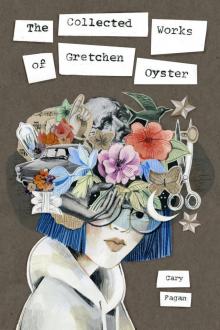 The Collected Works of Gretchen Oyster
The Collected Works of Gretchen Oyster Wolfie and Fly
Wolfie and Fly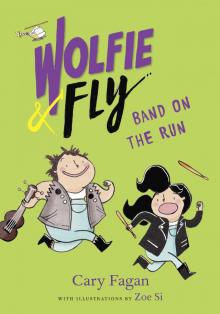 Band on the Run
Band on the Run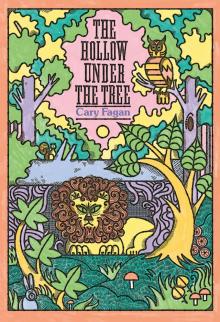 The Hollow under the Tree
The Hollow under the Tree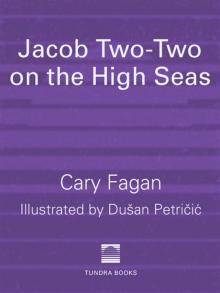 Jacob Two-Two on the High Seas
Jacob Two-Two on the High Seas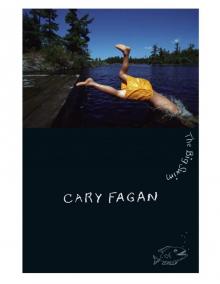 The Big Swim
The Big Swim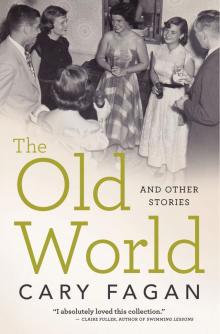 The Old World and Other Stories
The Old World and Other Stories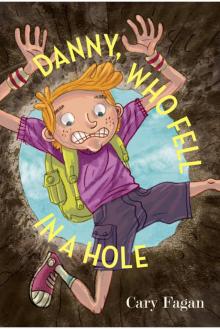 Danny, Who Fell in a Hole
Danny, Who Fell in a Hole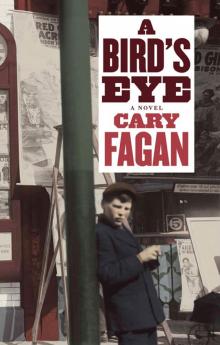 A Bird's Eye
A Bird's Eye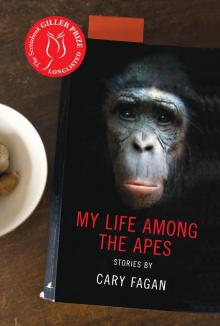 My Life Among the Apes
My Life Among the Apes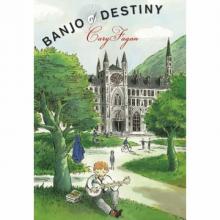 Banjo of Destiny
Banjo of Destiny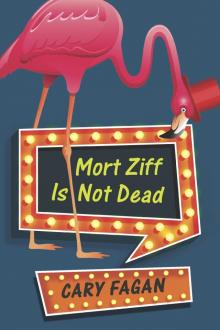 Mort Ziff Is Not Dead
Mort Ziff Is Not Dead